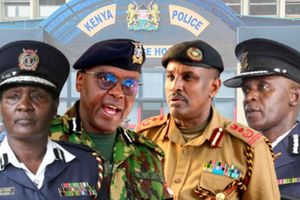
The National Assembly during a past session.
If MPs approve a Bill currently under consideration, officers who have attained the age of 60 years will be ineligible for appointment as Inspector-General or Deputy Inspector-General of the National Police Service.
The National Police Service (Amendment) Bill 2025 proposes an age limit of 60 years for those nominated and appointed to the offices of Inspector-General and Deputy Inspector-General of Police.
The legislative proposal by Teso North MP Oku Kaunya aims to address the current lacuna in the National Police Service Act, which does not stipulate an age requirement.
This means that the Inspector-General and Deputy Inspector-General are currently exempt from the mandatory retirement age of 60 years, as set out by the Public Service Commission.
“The Bill seeks to ensure that persons appointed to the offices have the ability to handle demanding situations within the police service and to help balance between the need to retain experienced leadership and allow for succession planning within the service,” reads the Bill.
Appearing before the National Assembly Committee on Administration and Internal Security to defend his Bill, Mr Kaunya urged his colleagues to support the proposed legislation saying it will bring order in the police service on matters of promotions.
“This Bill is informed by a gap that currently exists in the National Police Service Act which has no provision of the age requirement,” Mr Kaunya said.
The lawmaker pointed out that during the vetting of the current Inspector-General of Police Douglas Kanja, there was disquiet among various stakeholders who raised the age question that was hanging on the nominee’s head.
Loima MP Protus Akuja supported the amendment, saying “it will address the age question and if there are any exceptions, then it should be clearly stated as it is in the Public Service Commission.”
At the time President William Ruto nominated Mr Kanja as the IG and forwarded his name to parliament for vetting, he had already attained the age of 60 years. But since the National Police Act does not provide for the age limit, Mr Kanja was exempted from the mandatory age of 60 or 65 for those with disabilities as stipulated in the Public Service Commission Act and the House proceeded with his vetting and eventual approval.
Under Article 245(2) of the constitution, the Inspector-General is appointed by the President with the approval of the Parliament and exercises independent command of the National Police Service.
Mr Kaunya told the committee that a police officer’s work is very demanding hence requires a person who is physically and mentally fit.
“The office of the Inspector-General and the Deputy Inspector-General are quite demanding offices and require one to be fit,” he said. “We cannot leave out the age question open because in future we might have a president that will appoint an Inspector-General who is 100 years.”
The lawmaker pointed out that while in the military there is a clear structure of promotions and retirement age as stipulated in the Kenya Defence Forces Act, 2002, the current National Police Service Act lacks such provisions.
“In the military we don’t have that problem, it is clearly stipulated that after every four years, you are promoted and at 62 you retire,” Mr Kaunya said.
In the police service, the lowest ranked officer is a constable. Upon completion of three years and completion of the police laws exams, an officer in this rank is supposed to be promoted to the rank of a corporal.
The corporal is also supposed to move to the next rank of a sergeant upon undertaking various training but this is not often the case on the ground as many officers have stagnated in the same rank for years.
Many officers have often decried that promotion done in the service has never been based on merit but on other extraneous factors and external influence.





